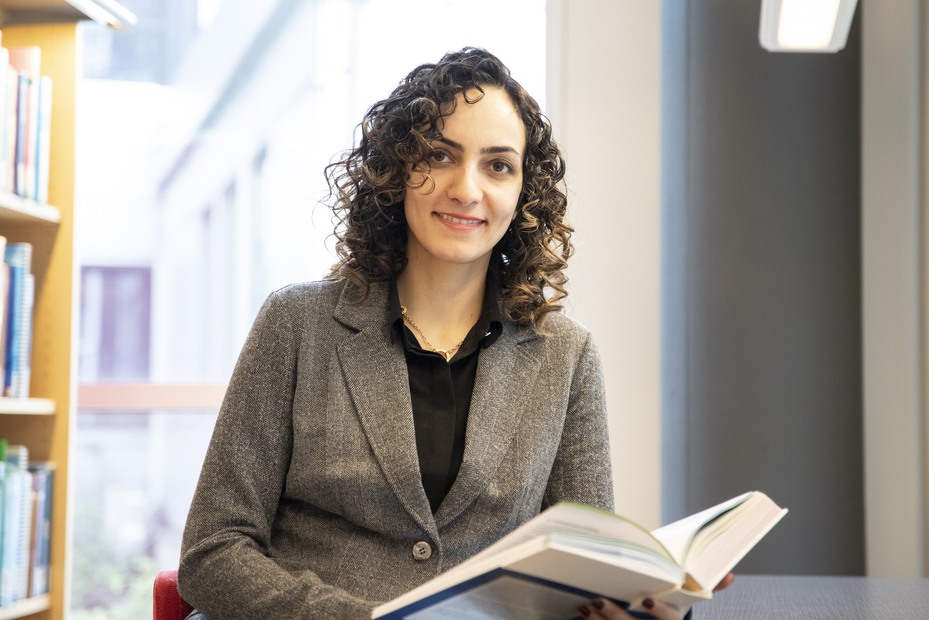Artificial intelligence could predict and prevent diseases
Farzaneh Etminani wants to see a healthier society by using artificial intelligence, AI, in the healthcare system. AI can help doctors diagnose patients, recommending the right treatments and making a prognosis. “I want to take it one step further and find out how we can predict and prevent different diseases with the help of AI”, says researcher Farzaneh Etminani.

By using artificial intelligence (AI) there are a lot of opportunities for improvements within the healthcare system. Especially today, when chronic diseases are one of the biggest challenges within medicine.
“AI could have a great impact – either as an assistant or complement, such as a decision aid, to help physicians be faster and more accurate, or as a tool to reveal new knowledge”, says Farzaneh Etminani, Assistant Professor in Information Technology and part of the Center for Applied Intelligent Systems Research (CAISR) at Halmstad University.
“We want to empower patients to get to know more about their health status, what kind of medication and treatment they need, how to follow the plan and what the consequences can be if they don’t.”
Farzaneh Etminani

Farzaneh Etminani, Assistant Professor in Information Technology.
Preventive and prescriptive healthcare
AI has been successful, using machine learning techniques, when it comes to diagnosing and prognosis. Now, physicians want to know more about how these AI models work. By opening up the models to medical experts, new areas of knowledge can be revealed. This concept is called Explainable AI (XAI).
“Therefore, going beyond prognostic models to preventive and even prescriptive healthcare is much more likely to become a reality”, says Farzaneh Etminani.
To be able to predict future diseases, the researchers in this field need information from the healthcare systems, like medical records. They also collect data from individual patients.
“We use a lot of smart sensors in our daily lives. Smartphones can for example monitor our sleep pattern, the number of steps taken during a day and our heart rate. We are working on the idea of connected health in order to link home care to hospital care and create a holistic view over patient trajectory in the healthcare system. Using AI on this big asset of collected data, it can assist in diagnosis, find interesting patterns, prognosis, and take more proactive actions rather than reactive”.
About Farzaneh Etminani
- Born in 1984 in Mashhad, Iran
- Education:
- Master’s in Computer Engineering from Ferdowsi University of Mashhad, 2007
- PhD in Computer Science 2013 at Ferdowsi University of Mashhad with the thesis “Bayesian Network Structure Learning from Data”
- Visiting PhD student at Linköping University 2011–2012
- Assistant Professor in Medical Informatics 2013–2019 at Mashhad University of Medical Sciences
- Started at Halmstad University in 2018 with the position of Researcher
- Assistant Professor in Information Technology (Machine Learning in specific) in 2020
Involving the patient through artificial intelligence
To prevent future diseases, it is also necessary to involve the patient, says Farzaneh Etminani, and make them more responsible for their own care. AI can help them to get a better understanding of themselves and their needs.
“We want to empower patients to get to know more about their health status, what kind of medication and treatment they need, how to follow the plan and what the consequences can be if they don’t.”
Farzaneh Etminani is currently working on a project called iMedA (Improving Medication Adherence through Person-Centered Care and Adaptive Interventions). The goal of the project is to improve the adherence of hypertension patients to their medication programme through adaptive digital interventions via a mobile application.
“We realised that different barriers lie behind medication and treatment non-compliance. In order to create a behavioural change that persists, the patient status and needs should be taken into account. By using Reinforcement Learning (RL) techniques, we try to adapt the delivered interventions to the patient’s needs and status through time”, says Farzaneh Etminani.
Increase patient motivation
Hypertension is a risk factor for many other diseases like heart failure, stroke and kidney disorder, so Farzaneh Etminani is examining how patients are dealing with their disease in relation to that. These conditions can often be prevented by controlling blood pressure. But patients with hypertension typically do not feel sick and therefore are not always motivated to listen to the doctor and follow advised treatments. Thus, an important goal with the research project is to increase the patient’s motivation.
“For instance, if I get in touch with my friends and colleagues who have a similar situation to mine, seeing what they do can have a huge impact on my motivation. The same type of incentive can be relevant for a person with hypertension”, says Farzaneh Etminani.

“When I was a child, I liked math, but what I really wanted was to become a pilot! Even though I did not choose pilot as a career path, I got a license and became an ultralight pilot in my spare time. I think it’s important to test you limits and spread your wings”, says Farzaneh Etminani.
Precision healthcare
One way to work with motivation is to empower patients by raising awareness on hypertension and a healthy lifestyle as well as other aspects that are important to hypertension patients.
“There are enormous amounts of information about hypertension on the internet, but no one has the time to read all of it. Our job is to find the right sort of intervention for the right person and deliver it at the right time, so-called precision healthcare”, says Farzaneh Etminani.
In other words, the information will be more individualised, since each of us have different needs. One person might for example need a reminder to take her medication in combination with some additional information. Another person might have different needs. Using AI, the healthcare system could be managed with greater speed and ease, with less expense and stress and without the patient even having to visit a doctor.
“Simply by increasing the level of knowledge from the beginning and having it individualised through the use of AI, we can prevent a lot of diseases and societal costs.”
“As a researcher, I can be a leader”

Farzaneh Etminani enjoys working with research and education:
“I think it is a nice mix of everything. Working at a university, I can teach the younger generations and transfer my knowledge, I can be a leader and a role model. I can be creative and do research without necessarily being limited to a specific direction of one company.”
“When I was a child, I liked math, but what I really wanted was to become a pilot! Even though I did not choose pilot as a career path, I got a license and became an ultralight pilot in my spare time. I think it’s important to test you limits and spread your wings”, says Farzaneh Etminani.
Text: Ragnhild Larsson and Louise Wandel
Photos: Ida Fridvall and Istock
About iMedA
The research project iMedA (Improving Medication Adherence through Person Centred Care and Adaptive Intervention) is cross-disciplinary, involving researchers from two research environments at Halmstad University, Embedded Intelligent Systems (EIS) and Center for Research on Welfare, Health and Sport (CVHI), as well as from Region Halland. This research project is well in line with the University’s profile area Health Innovation.


